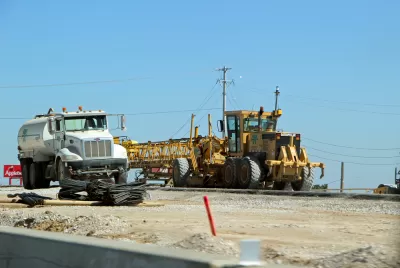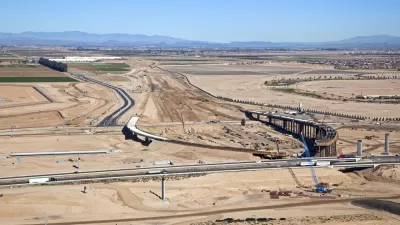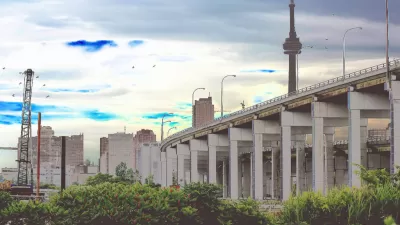U.S. transit projects have a much harder time getting environmental approval than road projects, perpetuating the dominance of cars in U.S. transportation policy.

Henry Grabar questions the logic of environmental review processes that delay transit projects and, counterintuitively, ease the way forward for highway construction. "[O]n the eve of a once-in-a-generation federal investment in infrastructure," Grabar writes, "the environmental review process for big projects is totally unfit for the task at hand. Transportation is the country’s largest source of carbon emissions, but ideas that aim to reduce dependence on planes, cars, and trucks have even more trouble gaining environmental approval than highways."
An "analysis of 180 projects here and abroad found that U.S. projects cost 50 percent more and take 18 months longer to conclude than similar projects abroad," in part because "American transit builders use environmental reviews as an opportunity to plan routes and engage with the community, transforming what might be a cut-and-dried assessment into an interminable back-and-forth."
Meanwhile, "the ease with which highways get funded and constructed, observes Joe Cortright at the think tank City Observatory in Portland, Oregon, makes it harder in turn for transit to prove its success" and helps, as Grabar puts it, "perpetuate the dominance of ice cap–melting SUVs in American transportation policy." A nationwide policy similar to California's 2020 decision to "exempt sustainable local transportation projects from undergoing analysis under the California Environmental Quality Act for the next four years" could alleviate the problem and give transit projects a fighting chance.
FULL STORY: The Perverse Reason It’s Easier to Build New Highways Than New Subways

Maui's Vacation Rental Debate Turns Ugly
Verbal attacks, misinformation campaigns and fistfights plague a high-stakes debate to convert thousands of vacation rentals into long-term housing.

Planetizen Federal Action Tracker
A weekly monitor of how Trump’s orders and actions are impacting planners and planning in America.

In Urban Planning, AI Prompting Could be the New Design Thinking
Creativity has long been key to great urban design. What if we see AI as our new creative partner?

King County Supportive Housing Program Offers Hope for Unhoused Residents
The county is taking a ‘Housing First’ approach that prioritizes getting people into housing, then offering wraparound supportive services.

Researchers Use AI to Get Clearer Picture of US Housing
Analysts are using artificial intelligence to supercharge their research by allowing them to comb through data faster. Though these AI tools can be error prone, they save time and housing researchers are optimistic about the future.

Making Shared Micromobility More Inclusive
Cities and shared mobility system operators can do more to include people with disabilities in planning and operations, per a new report.
Urban Design for Planners 1: Software Tools
This six-course series explores essential urban design concepts using open source software and equips planners with the tools they need to participate fully in the urban design process.
Planning for Universal Design
Learn the tools for implementing Universal Design in planning regulations.
planning NEXT
Appalachian Highlands Housing Partners
Mpact (founded as Rail~Volution)
City of Camden Redevelopment Agency
City of Astoria
City of Portland
City of Laramie





























